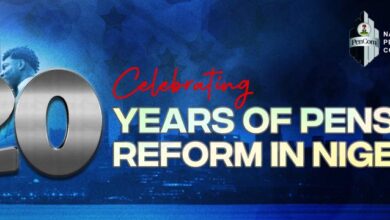NUP, SRAP kick against Governors’ plan to borrow N17trn from Pension funds

NGF Chairman, Kayode Fayemi
The National Union of Pensioners (NUP), the umbrella body of pensioners, and the Socio-Economic Rights and Accountability Project (SERAP) have kicked against the move by the Governors of the 36 states of the federation to borrow N17 trillion from pension funds, describing it as unconstitutional and insensitive.
In very clear terms, SERAP asked President, Muhammadu Buhari to use his “good office and leadership position to urgently instruct the Director-General and Board of the National Pension Commission (NPC) to use their statutory powers to stop the 36 state governors from borrowing and/or withdrawing N17 trillion from the pension funds purportedly for infrastructural development.”
The governors had last week resolved to borrow about N17 trillion from two sources intended for infrastructural developments.
First, they would borrow N2 trillion at nine per cent interest from the growing funds under the Contributory Pension Scheme, as well as accessing N15 trillion for national infrastructure funding through InfraCredit at a lower interest rate of five percent.
Responding to the gale of criticism trailing the plan, Nigerian Governors’ Forum (NGF) Chairman and Ekiti state Governor Governor, Kayode Fayemi said there was nothing wrong in the borrowing plan.
He made his colleagues’ position known Sunday night while featuring on Politics Sunday, a Channels programme.
Fayemi said: “There is nothing wrong and we are not going to be apologetic that we want to borrow to fund infrastructure. We are not borrowing for consumption and the various projects that are going to be allowed to access these funds are going to be determined by the committee that we set up at the National Economic Council NEC.”
While insisting the governors could access the funds, the governors said there was an urgent need for the country to increase infrastructural developments, by sourcing alternative means beyond the budget.
The governor who said Nigeria was not as rich as it used to be, said: “In the 2021 budget appropriation act, the ministry that has the highest allocation is the Ministry of Works and Housing with about over N400 billion, which is equivalent to less than $1 billion today.
“Between 2014 and 2019, Egypt for instance, constructed about 4,800 kilometres of road and spent in the middle of about $10 billion and the bulk of that came from the private sector.
“As we (governors) said, the way to go is to look at options that would enable us to undertake infrastructure development by accessing funding from the private sector. One such private sector funding is the pension fund which is sitting in various pension finance administrators and this money is already being borrowed by other elements.”
On the criticism and concerns that greeted the plan, the NGF said such fears were “misplaced” and not anything to be bothered about.
The forum, according to the Blueprint said: “There is also no doubt that there is a basis for a cost of governance reduction that is not in doubt. But if you want a government that you have elected into office to provide amenities that are in need by the citizens, you certainly do not expect these governors to use private funds or personal funds to do these things.
“We are going to look for creative ways to ensure that they meet the demands of the populace. And what are those ways; multilateral findings, if you have a good relationship with the World Bank, Africa Development Bank, Islamic Development Bank, in terms of developing financing and another private sector borrowing.
“In itself, it does not distract from fulfilling the conditions of the Fiscal Responsibility act, because the Debt Management Office will not even allow some states that are distressed to access private or external borrowing if they have gone beyond the threshold given to them as states.
“So that fear is misplaced and it is not something that we should bother ourselves with. The bottom line is that Nigeria is not the rich country we make it out to be, either at the federal level or the state level, we do not have enough resources to run the country. We are also challenged in fulfilling the promises made to the people.
“Not because states don’t want to do it, nor the federal government, but the resources are not necessarily there. That is why we have to look for means of making the resources available. Many of the projects that we are talking about are projects that would refer to as revenue-generating infrastructure.
“Roads that could be tolled, telecom projects, infrastructure manpower, water projects. So these are things that are necessary for infrastructure for us to improve our development indices, so borrowing isn’t necessarily a bad thing in that effect.”





